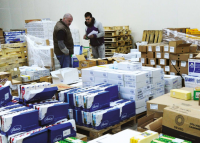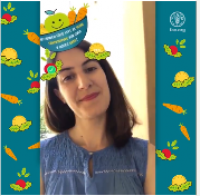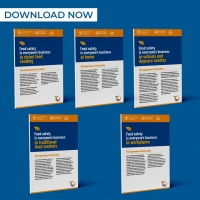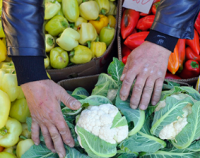News

08/08/2022
FAO has issued a new guidance document that explains how to design and implement a food control e-notification system according to a country’s needs and resources. The document, called Technical guidance for the implementation of e-notification systems for food control, walks readers through using e-notification data as a supporting instrument to improved import controls.
More than a third of agrifood exports cross borders at least twice before reaching the final consumer, creating new and greater challenges for the management of food safety as tracing the origin is more complex and time-consuming.
“As countries transition toward digitalization of food control systems, this...

01/07/2022
Upon detection of the Group B Streptococcus (GBS) in freshwater fish in several countries in Asia, FAO published a risk profile to raise awareness about the threat.
Masami Takeuchi, FAO Food Safety Officer, said many people aren’t aware of the risks associated with consuming raw freshwater fish, which is very common in Southeast Asia. “But the disease this practice can cause can be serious, though not always obvious, nor immediate, and in some cases that can make it difficult to diagnose and treat in time,” Takeuchi said.
Outside of Singapore where the first large-scale outbreak from consumption of raw...

28/06/2022
For good reason people want to know about imminent threats in advance – to get prepared to face and effectively manage them. In food safety, under the risk analysis umbrella, anticipation is possible through a combination of long-term, medium-term and short-term approaches, that include among others foresight which looks into drivers, analysis of scenarios and risk trends, risk assessment, early warning and rapid alert systems. Food safety early warning refers to a time spanning from the present for up to one year. Evidence screening and analysis is part of the early warning operations.
To better ensure the availability of safe food...

21/06/2022
Recently, an article on new foods and food production systems by Keya Mukherjee, FAO Food Safety Specialist, and Vittorio Fattori, FAO Food Safety Officer, was published in the Food Safety Magazine.
New foods are those that have not been widely consumed, either because their consumption has been historically restricted to certain regions in the world or they have recently emerged in the global retail space thanks to advances in science and technology. Some of these new foods are already showing up on our supermarket shelves - from plant-based oat or almond beverages to seaweed-based snacks and protein bars made from cricket flour. There are many others in this...

20/06/2022
How is the cell-based production technology carried out? Where can we find cell-based food products? What are the benefits of cell-based food? What has been done to ensure food safety?
These are the questions people may have when they hear of cell-based food products. They are no longer “future” products, as one of them has been already carefully assessed and approved by one country. The commercial landscape for cell-based food is fast expanding with various companies developing assorted products around the world.
To initiate open discussions among stakeholders, FAO and the Ministry of Health of Israel will hold a stakeholder roundtable meeting...

07/06/2022
What’s the connection between food safety and food security? That is the subject of a new video produced by FAO in all six official UN languages, explaining that food safety is part of food security.
Food security means having regular access to enough safe and nutritious food to lead an active and healthy life. “That makes food safety an integral part of food security,” the text on screen reads.
To end hunger and achieve food security, we must ensure access to safe food for all.
FAO leads international efforts to defeat hunger worldwide and works to strengthen food safety as part of its...

06/06/2022
Jeffrey LeJeune, FAO Food Safety Officer, and WHO Scientist, Simone Moraes Raszl joined a social media live Q&A event on Facebook, Twitter and YouTube on Monday, 6 June 2022, as part of this year’s World Food Safety Day celebrations. Interested to learn more about “safer food, better health”?
Read more here
Watch the recording

05/06/2022
For World Food Safety Day this year a fun filter is available for use on Instagram and Facebook.
With an interactive food basket on their heads, users are asked practical questions about food safety, to which they answer ‘yes’ or ‘no’ with a tilt of the head, left or right.
Test your knowledge about hand hygiene and safe food storage, record your efforts and tag @FAO in your video post. It’s also a way to raise awareness and inspire action on World Food Safety Day.
Access the filter
On your phone, click on the below links
Instagram: https://www.instagram.com/ar/477261520869212/ Facebook:...

03/06/2022
Five new leaflets have been produced by FAO and WHO and released today as part of the materials for this year’s observance of World Food Safety Day.
The two-page leaflets offer information and advice on food safety for the people in different settings where food is produced or consumed. These include workplaces, traditional food markets, street food vending, schools and daycare centres and the home.
Advice includes making use of WHO’s Five Keys to Safer Food, ensuring good hand hygiene, providing employees with facilities to safely store and heat food, and teaching young people how to ensure their food is safe.
Access the...

27/05/2022
Jorge Pinto Ferreira, FAO Food Safety Officer, gave a presentation, on 23 May 2022, that was part of a webinar series organized by the University of Georgia Center for Food Safety (USA). The presentation was entitled “Are Food Safety and AMR Friends on Instagram?” The interconnections between several different disciplines, when it comes to antimicrobial resistance (AMR), were highlighted as well as the sometimes not so obvious link between food safety, food security and AMR. It was also a good opportunity to present the ACT (Antimicrobial Codex Texts) project, funded by the Republic of Korea, that FAO is carrying out...
Stay up to date and connect to our RSS feed!
